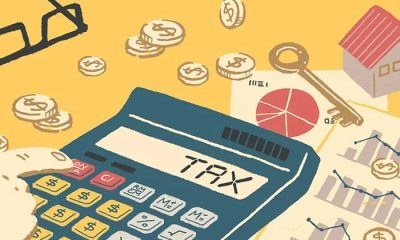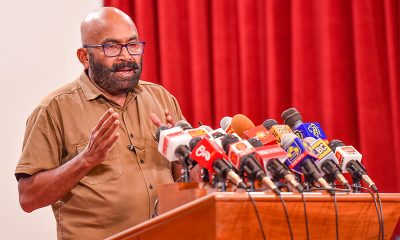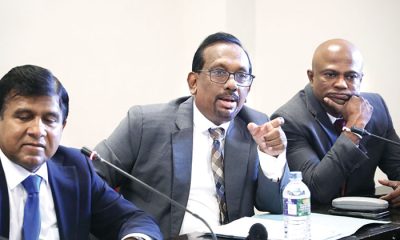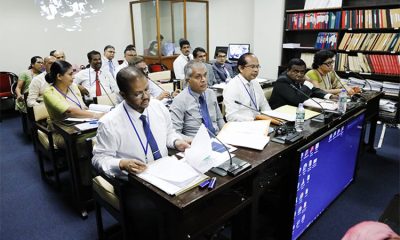Editorial
Income tax a necessary evil

Our front page lead story last Sunday, headlined “Cops join IRD to raise revenue,” scooped the news that the police has launched a new collaboration with the Inland Revenue Department (IRD) to track down unexplained wealth and chase black money. This, as our story explained, was a spin-off from the widely publicized cases involving Pastor (also called Prophet) Jerome Fernando who has still not returned to the country after the smelly stuff hit the fan and a lady named Thilini Priyamali, who had allegedly collected some Rs. 226 million entrusted to her for investment, no doubt at sky high interests rates. Her clients, including reportedly some yet unnamed politicians and others have not come forward to assist the investigation. This is most probably because they prefer not to discuss the sources of what appears to be black money.
Pastor Jerome, it has been reported, had spent as much as Rs. 12 billion on his miracle dome. This, by any standard, is very high expenditure involving big bucks. No doubt much of this cash was donated by well wishers abroad, whom he clearly does not lack. But such cash infusions are subject to various regulations and interest and other earnings from such funds, we believe, must be liable to tax. Thus it makes sense that while the police continue with criminal investigations as required, the Inland Revenue Department ensures that obligatory tax payments are made. Whether the two agencies have been hitherto sharing information with each other for the benefit of the tax exchequer, we do not know. But it is obvious that they should be. Our report referred to a “new collaboration” suggesting this was not part of the already established scheme of things.
It was reported last week that the parliamentary oversight committee for National Economic and Physical Planning examining the performance of the various agencies responsible for the collection of state revenue found they are way behind target. It is fairly well known that three departments, Inland Revenue, Customs and Excise are the big revenue collectors for the government. It is also known that corruption is widely prevalent in all three agencies.
Former Minister Mahindananda Aluthgamage who chairs the oversight committee went on record a few days ago saying that although a collection of over Rs. 3.1 billion this year had been set for these three departments, approximately only half this amount had been, collected up to now. Where the Inland Revenue Department is concerned, Aluthgamage made some startling disclosures, long suspected but without an official imprimatur. Among these he was reported in the state-controlled Daily News to have said that although there are over 105,000 companies in business, only 15,000 are taxpayers.
This is not all. The number of personal income tax files on the books of the IRD standing at 500,000 in a population of 22 million is dismally low. And of these only 31,000 pay personal income tax, it was claimed. The Daily News report said the number of personal tax files was down to 295,000 last year and this had further shrunk this year.
According to an Economy Next report we front page today there is just one taxpayer on the IRD books paying over Rs. 300 million annually as income tax. Most people would dearly love to know who this worthy is. That report also gave numbers of those taxpayers on the high end of the taxpayers list. Whether these figures are accurate or not, we do not know.. Hopefully the IRD will clarify.
It was not so long ago that the government announced that all persons above the age of 18-years must have a tax file. This is all pie in the sky. The IRD lacks the will, technology and the personnel to achieve this target – if it is indeed a target. Time was when the annual administration report of the Commissioner of Inland Revenue, now grandly titled Commissioner General, published a list of names of individuals penalized for tax offences. Several decades ago, one of these lists included the name of a lawyer who is now a cabinet minister! Administration reports issued annually by government departments now appear to be a matter of history. It would be a good thing if the practice of publishing such reports is revived.
A frequent complaint by the few taxpayers who meet their obligations is that the IRD has a weakness for squeezing already squeezed lemons – that is taxpayers already on file. While widespread evasion is rampant, people who are paying taxes are often harassed by the department. IRD once upon a time rewarded good taxpayers with privileges including the right to purchase a vehicle at reduced import duties.
Those goodies are now history. The Pay-As-You-Earn (PAYE) tax system and withholding tax (WHT) on dividends and interest was something which was easy to administer and must certainly have greatly helped collection. While steps have been taken over the years to raise taxable thresholds on individuals, these by no means have kept pace with inflation.
As is frequently said, the only certainties of life are taxes and death. Professionals have been stridently protesting about the recently increased income tax rates with some even claiming that this is part of the reason some of them are quitting the country. Lankans can legitimately say that the mileage they get for their tax rupees is not satisfactory. Income tax payers often think that they carry a vast tax burden that is not evenly distributed. That is not without truth but there is very little realization among well to do income tax payers that the poor pay a big part of the indirect taxes that flow into the state exchequer. As an old time editor of an English newspaper in then Ceylon once said, each time you strike a match or flush the toilet, you are paying a tax!
Editorial
Ensure safety of COPF Chairman

Saturday 8th June, 2024
It was with shock and dismay that we received the news about death threats to COPF (Committee on Public Finance) Chairman Dr. Harsha de Silva over the ongoing parliamentary probe into the on-arrival visa scam. Dr. de Silva yesterday told Speaker Mahinda Yapa Abeywardena, in Parliament, that he was facing death threats and intimidation, and it was incumbent upon Parliament to ensure his safety. He stopped short of naming names, but revealed that some ruling party MPs were among those who had ganged up against him. The Speaker only said there had been no complaint, and he would look into the matter.
The SLPP-UNP government has been doing everything in its power to have all parliamentary committees under its thumb. The COPE (Committee on Public Enterprises), which once helped restore public faith in the legislature by exposing state sector corruption, has now become a mere appendage of the incumbent regime, thanks to the appointment of SLPP MP Rohitha Abeygunawardena as its Chairman. The SLPP-UNP combine also tried to oust COPF Chairman Dr. de Silva, but in vain. However, it knows more than one way to shoe a horse.
The COPF, under Dr. de Silva’s chairmanship, has been a thorn in the side of the government, which is struggling to cover up numerous corrupt deals. Dr. de Silva yesterday told Parliament that he found it extremely difficult to function as the COPF head due to severe resource constraints his committee was facing; he himself had to pay the salaries of some of his staff members besides burning the midnight oil.
The sheer workload he had to cope with as the COPF chief had taken its toll on his health, he said, informing the Speaker that he was at the end of his tether, and at times thought of resigning from the COPF. This is exactly what the government wants him to do; resource squeezes and threats are aimed at making him quit.
On 26 May, Dr. de Silva revealed, in an ‘X’ post, that the COPF had uncovered some vital information about the visa scam and it would reveal everything after its final meeting on the issue; the COPF was committed to exposing the truth behind the controversial tender, he added. In an editorial comment on 27 May, we warned him.
While thanking him for his bold stand, we pointed out that by making such a statement, he had thrown caution to the wind, and become a marked target, with the government making an all-out effort to delay the COPF investigation lest the truth should come out much to the detriment of its interests in this election year. Unfortunately, what was feared has come about; Dr. de Silva is complaining of death threats and government moves to strangulate the COPF financially to derail its investigations.
Dr. de Silva’s predicament exemplifies the fate that befalls the few good men and women in Parliament. It is hoped that all those who seek an end to the state sector corruption will rally behind Dr. de Silva, and bring pressure to bear on the government to ensure his safety. Let Dr. de Silva be urged to reveal the names of those who have issued threats, veiled or otherwise, to him and are trying to scuttle the COPF probes.
Editorial
Dead man walking!

Friday 7th June, 2024
The SLPP-UNP government is going hell for leather to make bad laws as if there were no tomorrow. It is abusing its parliamentary majority, which has been retained with the help of some crossovers, for that purpose. The Opposition, the media and trade unions are up in arms, and understandably so. The incumbent regime is a dead man walking; it is so desperate that it is capable of anything. Hence the need for it to be restrained.
The Electricity (Amendment) Bill (EAB) plunged Parliament into turmoil yesterday, but the government secured its passage. The Supreme Court (SC) determined the entire EAB inconsistent with the Constitution and recommended changes thereto. After unveiling the Bill, sometime ago, Minister of Power and Energy Kanchana Wijesekera hailed it as an excellent piece of legislation aimed at straightening up the power sector to serve the public interest better.
The SC determination left him with egg on his face. He reminded us of the proverbial curate who, while eating a stale egg, assured his host, a Bishop, that parts of it were excellent. Wijesekera’s egg, as it were, made Parliament stink yesterday, but he sought to please his masters by praising it as a silver bullet.
EAB should have been discarded and a new one drafted in consultation with all stakeholders. But the government is apparently driven by an ulterior motive; its aim is not to serve Sri Lanka’s interests but to look after those of some moneybags.
It is not uncommon for Bills to contain some flaws, which are rectified either before or during the committee stage. But there is something terribly wrong with draft Bills that are full of sections inconsistent with the Constitution. The drafters of EAB have demonstrated their sheer ignorance of the supreme law, and that they are not equal to the task of drafting Bills. If they had read the Constitution at least perfunctorily, they would not have drafted such a bad law.
Ignorant and incompetent, they do not deserve to be paid with public funds and must be sent back to law school. They must be summoned before Parliament and questioned on their serious lapses, which have caused public faith in the national legislature to diminish.
Curiously, the MPs who demand that judges, doctors, Central Bankers, and other public officials be summoned before Parliament have taken badly drafted Bills for granted. The power sector trade unions yesterday alleged that EAB was of Indian origin and geared towards furthering the interests of Adani Group at the expense of Sri Lanka.
Most critics of EAB are agreeable in principle to the need for power sector reforms; the Ceylon Electricity Board should be given a radical shake-up, and transformed into a modern organisation capable of providing a better service at a lower cost. They only asked the government to tread cautiously, consulting all stakeholders and taking action to ensure that the country’s interests prevailed over everything else. But the government was in a mighty hurry to steamroller the Bill through Parliament, making the Opposition ask whether it was doing so at the behest of some external forces involved in controversial power generation deals here.
What is passed by the current Parliament can be either amended or abolished by a future parliament in a constitutionally prescribed manner. But that does not mean that a government is free to pass bad laws, making the country enter into long-term agreements with powerful nations and their investors. It looks as if the SLPP-UNP regime did not care two hoots about the consequences of its actions.
Editorial
Modi Magic on the wane

Thursday 6th June, 2024
The outcome of India’s parliamentary election (2024) has led to a ‘perspective ambiguity’. Prime Minister Narendra Modi lost no time in declaring victory for the BJP-led NDA alliance, which secured 293 seats in the 543-member Parliament, but he must be a worried man. The BJP is short of 32 seats to form a government under its own steam; it has lost 63 seats or about 20% of its parliamentary strength. It had 303 seats in the previous Parliament, and that number has dropped to 240.
Modi has become the second Indian Prime Minister to win a third term. The first PM to do so was Jawaharlal Nehru. But Nehru won an outright majority in Parliament in 1962; Modi has had to depend on smaller parties in his alliance to retain his hold on power. Modi must be reeling from a sharp drop in his victory margin in his own constituency, Varanasi; it has decreased to 152,000 from 480,000 in 2019 whereas Modi’s bete noire, Rahul Gandhi, won Raebareli by a staggering 390,000 votes.
Modi, who reigned supreme with 303 seats in the previous Parliament, is now dependent on parties such as Nitish Kumar’s JD-U and Chandrababu Naidu’s TDP to form a government. He has had to lead an alliance of strange bedfellows. Both Kumar and Naidu were bitter critics of Modi. Kumar helped form the oppositional alliance, the INDIA bloc, before switching his allegiance to PM Modi. Naidu also closed ranks with the BJP in the run-up to the election. These politicians have been described as extremely ambitious and highly unpredictable, and whether Modi will be able to manage them and consolidate his grip on the NDA alliance remains to be seen. They will demand plum ministerial posts in return for their support. The TDP is said to be eyeing Transport and Health portfolios! That is the name of the game in coalition politics, where it is not uncommon for the tail to wag the dog, so to speak. These two political leaders are however not the only problem Modi will have to contend with. The next five years will feel like an eternity for PM Modi.
Nothing would have been more shocking for the BJP than its defeat in Uttar Pradesh’s Faizabad constituency, where the Ram Mandir has been built. Modi may have thought he would be able to win the Lok Sabha election hands down after the consecration of that temple, which became a centrepiece of the BJP’s election campaign. The BJP lost that seat to the Samajwadi Party! Modi must be disappointed that the Ram Mandir hype failed to trigger a massive wave of support for his party. This particular defeat signifies a massive setback for the BJP’s ethno-religious agenda.
Modi’s divisive election campaign failed to yield the desired result. The BJP’s failure to secure an outright majority could be attributed to a host of factors, some of them being the suppression of the Opposition, the arrogance of power, chronic unemployment, and the rising cost of living. The BJP also did not care to reimage itself in a positive light to attract the youth.
Modi will hereafter see the Congress-led INDIA bloc with 223 seats, in his rearview mirror. The Congress (99 seats) and its allies have eaten into the BJP support base considerably, but they have a long way to go before being able to capture power.
The bumpy ride ahead for the BJP-led coalition government to be formed may improve the INDIA bloc’s chances of bettering their electoral performance and turning the tables on the BJP and its allies in time to come. Modi will have a lot to worry about in his third term.
























